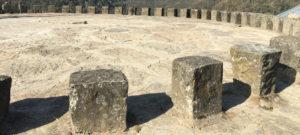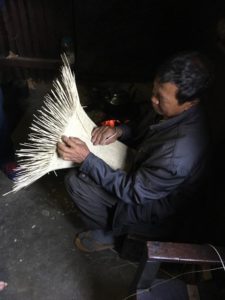Khonoma illustrates the real-time dismantling by global capitalism of generations-old knowledge and norms that sustain food, water, culture, and people. It’s a sadly familiar struggle that has played out countless times around the globe: here in Khonoma you can feel and see it unfolding.
Khonoma is a village of 3-4000 people that thrived for centuries in what seems an agrarian paradise nestled in the steep and rugged hillsides of Nagaland in northeast India, near Burma. Rich cultural traditions are pridefully commemorated, shared, and celebrated, including decision circles where community members gather to speak, resolve conflict, and plan for the future. Villagers pridefully note their ancestors successfully resisted Britain’s colonial efforts.
Generations of learning-by-doing produced agri-cultural practices that sustain natural beauty, cultural integrity, and abundant water, food, and fuel. Several examples:
Wild vegetables grow abundantly in the village’s commonly shared forests and fields. Residents regularly consume them in daily meals, creating a distinctive cuisine (worth the trip!). Villagers may harvest as much as their families can eat, but may not sell any excess in the market for a profit. This limit on capitalist trade protects the vegetables from exploitation—people get what they need, but not more to sell and purchase luxuries.
Families manage their own terraced fields to grow vegetables and rice for their own consumption as well as sale in the nearest villages or city (Kohima). The water on which the crops depend is shared. Clusters of 5-10 terraces are networked so that water flows from one terrace to another. Over generations, the norm emerged that the owner of the lowest terrace controls the flow of water into the top terrace so everyone is motivated to collaborate and share the water needed for all crops and families to flourish.
Wild apple trees grow in the village’s commonly owned and managed forest. They produce a delightful and highly sought-after snack of fermented dried apples. Yum! Demand from neighboring population centers and tourists quickly outpace supply, so dried apple production provides a great way to supplement household income. Why aren’t apple trees aren’t over-exploited? A norm has emerged that allows villagers to only harvest apples fallen to the ground, that way the resource is shared and the trees protected (they break when climbed).
Many other norms and shared practices exist to not just sustain ample agriculture, fuel, and water, but also promote a thriving culture. Crime is low to nonexistent. Elders are respected. Celebrations are common. All children are well educated. Everyone morns a death and celebrates a birth. People work hard and have dignity.
Global capitalism is eroding it all. The norms and practices that sustain the commons must be maintained by celebrating the people who conform and shaming and blaming those that don’t. That social fabric is fraying. Wealth leads to inequity that leads to envy. A few families are getting rich by working in the nearest city or, because they are so well educated, joining the professional class elsewhere. Acting in their own rational best interests, those benefiting from capitalism’s rewards build bigger houses, send their children away to better schools, and connect to networks and opportunities outside the village. Factions form within the community that undermine the collective decision-making process.
Tourism enters: first as a rational self-interested way for villagers to make money. Residents add rooms and provide homestays. A hotel or two go up. Guided walks emerge and village homes get visited to view residents as they make baskets, weave tapestries, and cook distinctive cuisine. At first, the village craftsman and craftswomen are flattered by the attention and eager to please. The early explorer tourists, who seek authenticity and happily endure travel hardships, are tremendously respectful. But, looking into the future, it’s easy to see that a different class of tourists will come, wanting escape and entertainment and comfort and service and standards to which they’ve grown accustomed back in the city. The craftspeople will be objectified, demeaned, and turned into roadside attractions.
Khonoma’s traditional culture is a commons resource and villagers don’t have the norms and practices they need to prevent destroying it because village elders, who, over generations of learning by doing, figured out how to sustain tangible resources such as food, fuel, and water, did not create practices and norms for protecting culture from tourism. A few villagers will likely get wealthy before the charm wears off, but Khonoma could lose that special something that defines it. The social fabric could continue to weaken. Further, the transportation systems that the government is improving so as to attract tourists will also enable locals to more easily commute to work outside the village and earn more money than agriculture allows (in part because global trade keeps driving down the price of commodities) Easily bought food and fuel will replace what villagers now produce with intense and prolonged manual labor. Traditional practices and norms will be forgotten. Another culture will bite the dust. So seems one likely scenario.
Some of the most perplexing sustainability challenges emerge because of this phenomenon: the tragedy of the commons. In the classic formulation, a few individuals acting in their own best interest put extra cows on the common grazing land, increasing their family’s milk productivity and income. Others follow suit. The accumulating pressures of many more cows eventually destroy the pasture and everyone is worse off as a result. Individually, people are acting rationally; collectively, they act as if insane, creating results no one wants. Capitalism and markets can’t solve many of these problems—but wise village elders could, given the time to do so. Unfortunately, the problems we face today differ dramatically from anything village elders could imagine—climate change and cultural exploitation among them. Fortunately solutions exit, but they require good governance. Engage!

